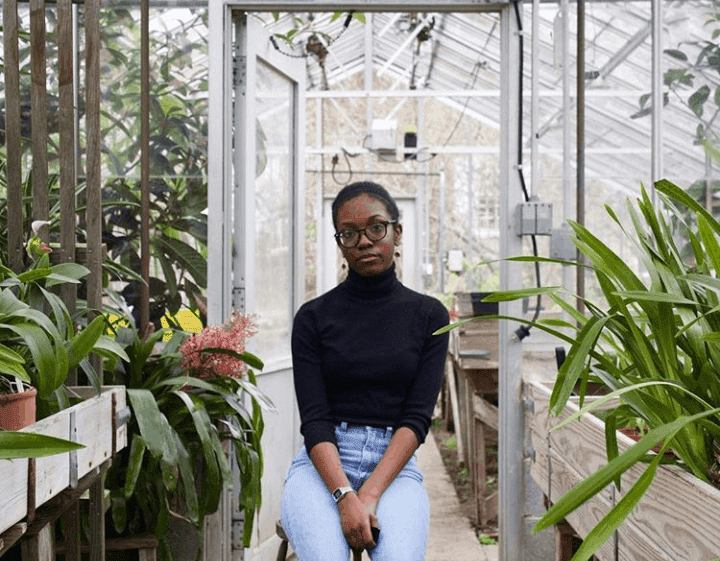
Amaan Stewart poses in Westtown's greenhouse
Meet The Creator: Amaan Stewart
[Tricia]: Can you believe I got rejected from Whole Foods again?
[Amaan]: Yeah, my friend also got rejected from Whole Foods, even though it’s just a grocery store.
[Tricia]: I even did the whole thing like, “I didn’t know how to eat healthy when I was a child”, and they still didn’t pick it up.
[Amaan]: I gave you my life story. I gave you my personal narrative.
[Tricia]: I gave you my trauma. I gave you canned beans instead of fresh and organic.
[Amaan]: Exactly!
[Tricia]: Okay, back to talking about the environment, back to business.
So I obviously know who you are. We’ve obviously shared such good memories with each other, but if you could just introduce yourself, y’know how did we get to this point in our lives, all of that good stuff.
[Amaan]: Yes, Yes, Yes. Hello, phone recorder. My name is Amaan Stewart. I am a current student at New York University. I am a senior and I study Environmental Studies, with minors in film production and social & cultural analysis.
I know the lovely correspondent, Tricia De Souza — a loooonngg, lengthy friendship, tumultuous relationship. We went to high school together, a Quaker boarding school, and that’s where we bonded over the weird stuff that happened.
I am interested in a career in documentary work and eventually, narrative filmmaking. That is the journey that I am on currently.
[Tricia]: So friend, you made this amazing podcast and could you tell me the name of the podcast and how you started on this project?
[Amaan]: The podcast I made is called “The West Philadelphia Problem: From Red-lining to Penntrification”, and it was for one of my summer classes called ‘Race, Space and Policing.’ We had the option of either doing a research paper or a more creative project.
And I love podcasts. I put people onto podcasts *Tricia*.
And so, I wanted to try something different than video. So I made the podcast, with the help of Tricia, and I’m really proud of how it turned out.
[Tricia]: Of course, you did a great job, our resident director.
So your podcast is on gentrification in Philadelphia, so why and how did you choose that specific topic, and what does it mean for you to make a creative project like a podcast?
[Amaan]: The class that I took was extremely prolific. I was learning about systems like colonialism, in different perspectives than I have learned previously. And I was starting to make connections outside of the readings, and into my personal life.
‘I have personally felt like I have been battling a lot with what it means to be a gentrifier.’
And the class really focused on urban spaces since it is a metropolitan class, and the core of it is urban planning, city planning, and things of that nature, and how it affects communities, and how communities evolve. So while a lot of it is focused on New York City, and other major cities, it was mentioned a lot that Philadelphia is one of the hallmark cities of urban planning that a lot of metropolitan studies classes focus on.
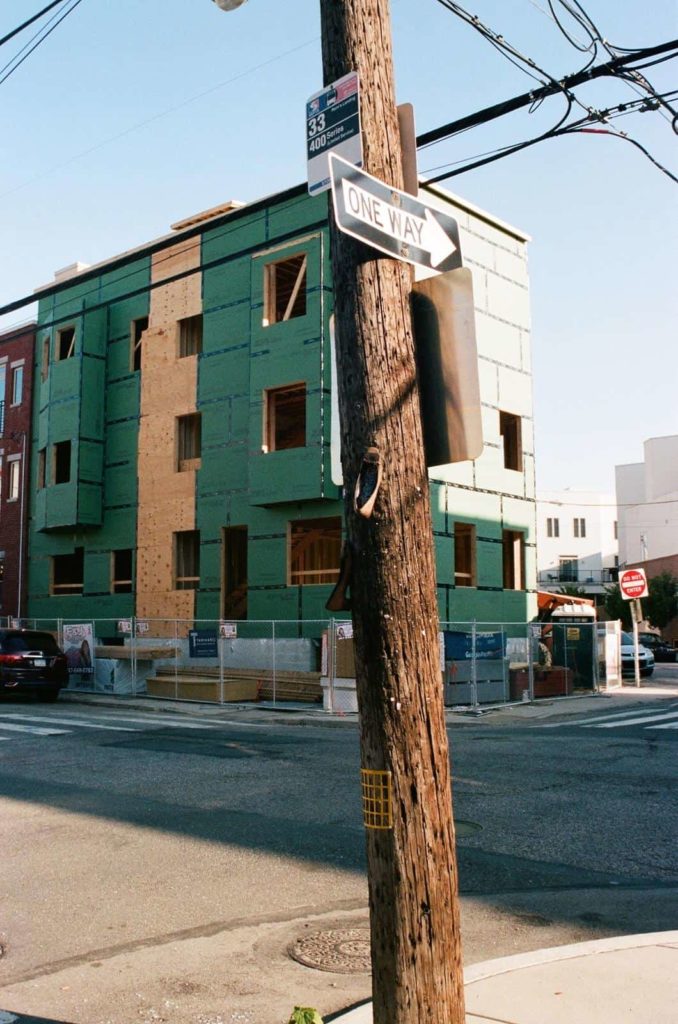
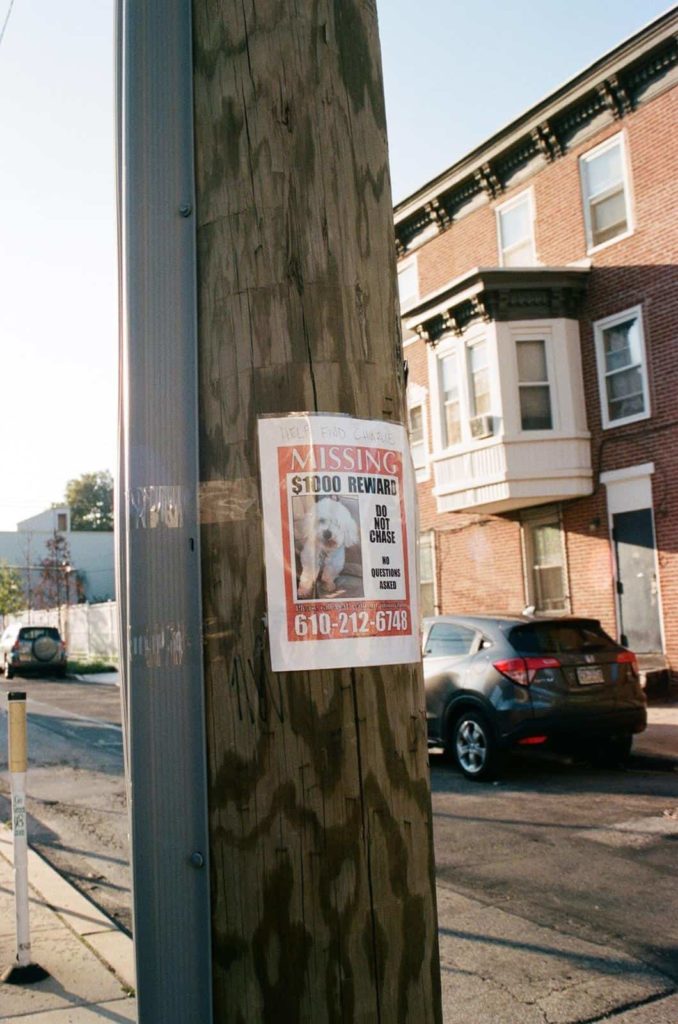
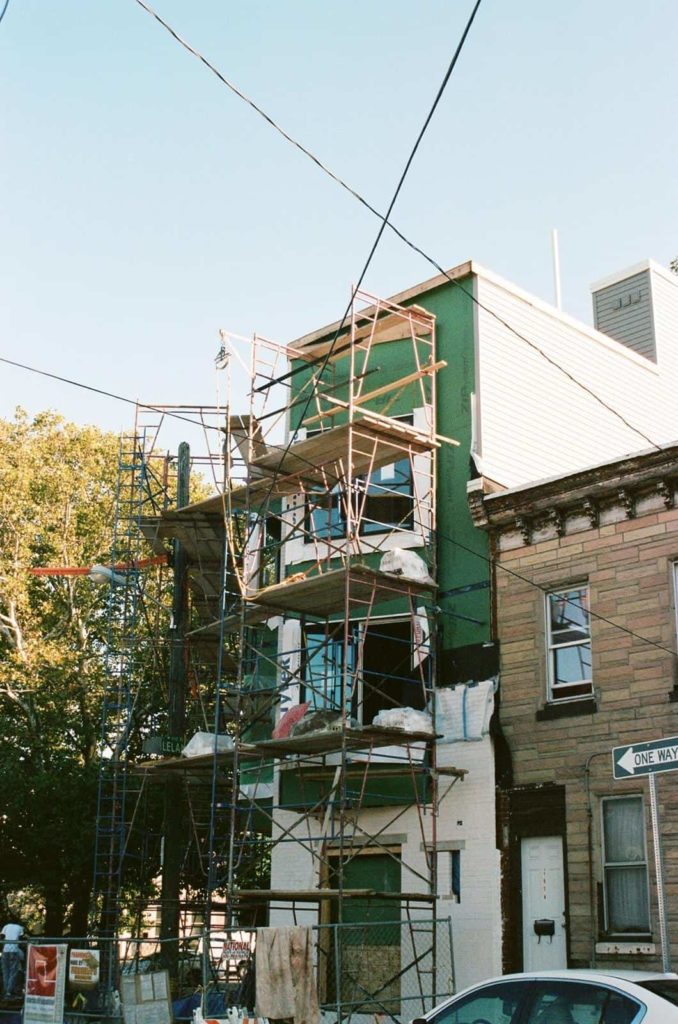
I am a current resident of Philadelphia, and I have lived here for 5 to 6 years, and I have a very extensive family history in Philadelphia, especially in places where you can very much see the effects of gentrification taking place. Since I live in the Center City / North Philly area, I was originally thinking about doing research on North Philly but I then focused on West Philadelphia.
I knew that you [Tricia] were planning on doing research on the effects of University of Pennsylvania in Philadelphia so it was becoming more clear that I should center on West Philadelphia, and then as I was doing more research, I found places like the Black Bottom, this predominantly Black area in Philadelphia and wanted to learn more about it.
And again through that, I happened to find out that my grandmother used to be a resident of the Black Bottom so I thought this would be a perfect opportunity to understand the evolution of West Philadelphia since I have a primary resource that can talk about their experience.
I was also really interested in the idea of oral history, and what preserving the stories of people looks like.
[Tricia]: Thank you for such a well thought answer, that really sheds a light on the personal aspect of all of this.
I have lived in Philadelphia since I was five years old and every time I go back there, either if it was coming from boarding school or college, I would see drastic changes in the neighborhood. And even though I also live in Center City and it’s a predominantly, wealthier part of Philly you can still see the ramifications of gentrification even in the area.
So I was wondering for you how it has been as a Philadelphia resident but as someone who primarily grew up in New York City, and may have also been thinking about gentrification previous to this project, to create a podcast like this?
‘[As a student] you should always be critical of the institution you are in, and don’t ever think you are unwarranted, or that you are being too hard on them. It’s important that the work continues.’
[Amaan]: It’s truly interesting because I have personally felt like I have been battling a lot with what it means to be a gentrifier. Again, I am not native to Philadelphia, even though I have a long history of family in the city.
My financial background, I guess, is slightly well-off. It’s not like an abundance. We have had periods of struggle but most of the time, it’s not too bad and so I have been able to live in Center City / Old City, and or on the periphery.
Like there is a new Whole Foods near me, and private developments near me. So I’ve been thinking about whether I benefit from gentrification.
In 2017, I did a [photo] series on gentrification in North Philly. So I’ve been deeper into North Philly, like I’ve gone grocery shopping deep into West Philadelphia, up on 60th street and Market because I had a grandfather that lived there so I’m very comfortable in those areas. So I don’t feel like ‘the other’ or out of place in those areas and so I was walking around North Philly, and just seeing the new developments that are springing up there. Like all of it is construction and things of that nature.
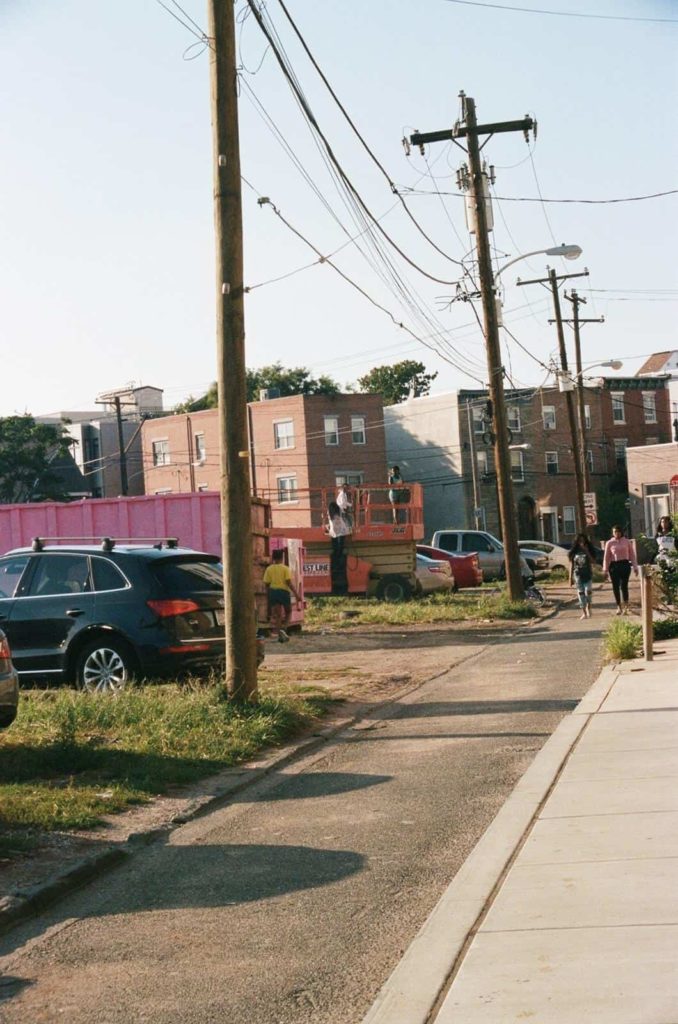
North Philadelphia sidewalk and houses
Even though I am used to seeing that. it is still very jarring to see that– so when you not only see the physical makeup of the community changing but you also see the population changing as well.
It is interesting but also really saddening to see, cause you know what’s going to happen for the most part.
And it’s interesting because we both have a friend that goes to UPenn and seeing, like, the mixture of UPenn students, businesses made for students, etc. and the people from that neighborhood, it feels somewhat odd — like a twilight zone.
Especially when you see the older buildings mixed with the newer student dorms and student apartments. It feels like dramatic irony — like you as someone who isn’t part of this world, you can identify parts of the community that are changing and not necessarily for the better.
You kind of wish that it didn’t have to be this way. It’s not that you can’t do anything about it but, [some things] are outside of your hands. I feel weirdly voyeuristic when it comes to everything that is going on.
‘Especially when you see the older buildings mixed with the newer student dorms and student apartments. It feels like dramatic irony — like you as someone who isn’t part of this world, can identify parts of the community that are changing and not necessarily for the better.’
Speaking about New York, like I said before, this isn’t a new thing for me to see. But I am still taken aback and very observant when I do see it.
Before I lived in Philadelphia, I lived in New York City for around 6 years and I lived in predominantly Black and Latino neighborhoods. I lived in East Harlem for a minute and I lived in South Harlem, and the area around where Columbia [University] is, around 133rd St. So I really got a first-hand experience on what a college should be as a private developer.
[There] was always talk among my mother and people in the community about how Columbia really overextends. And it is really upsetting.
At the time, my mother was going to Teachers College at Columbia so it was like a weird juxtaposition to be a part of. And recently when I came back for college [New York University], I had travelled up to Washington Heights and I didn’t even know that Columbia was even extending that far up town, cause I think they have one of those hospitals up there. So even considering the different areas now around the hospital it was so incredible for me to see. And it was so disheartening at the same time.
So my relationship with the subject matter has always been a complex one for me.
I have really appreciated going through the history and seeing the historical context unfold and how it precipitated into now, just having a better understanding of everything has been really grounding for me.
[Tricia]: Yeah, when you were talking about Columbia, it brought me back to the times that I have run around West Philadelphia, and always thinking like
I had that same feeling that you had when you are going deep, deep into a place and thinking there is no way that this college is going to be able to extend so far, and yet, I saw a plaque of Penn and it is this development property.
And I just thought, this is never going to end.
So, I was wondering if you could talk about your family. You talk with your grandmother and I feel like that conversation really brought in such an intimate look into effects of penntrification. So how did that conversation feel like for you, do you feel like you learned more about your grandmother and your personal history?

Amaan's Grandmother, Christine Fore, posing for a picture
[Amaan]: Talking to my grandmother, having this opportunity with her, made me feel closer to her, and appreciate her more. I was able to have this really intimate conversation with her and she really appreciated me talking with her because it was really such a good time for her that she loved a lot.
She really puts Philadelphia very close to her heart.
She doesn’t live here anymore, she lives in Virginia now but she really appreciated being able to go back in that time, and be very nostalgic about it. So I just really appreciated having that conversation with my grandmother on that level, like hearing how happy she was, was really nice.
But going into that conversation with her was interesting because I knew the exact story that I wanted to tell. So I was really hoping that her interview would very much supplement that.
I was very much going into this expecting answers like Penn is bad, Penn did nothing good for the community, Penn was nowhere near helpful. I was looking for answers like that because that was the angle in which the podcast was going.
It is interesting because she is a first-hand example of the ways in which UPenn sold these ideas of them expanding in the community as something that would better [the residents].
It wasn’t that she was extremely supportive of the actions that UPenn was taking, but she was talking about how Mayor Rizzo came to her wedding and how it was an amazing time. And I think now it is very much understood that Mayor Rizzo was not “for the cause”. But it does provide a different perspective at that time, and how things were kind of sold to the public.
‘It is so important to place these conversations [on gentrification] at the forefront of how we construct education, because school is meant to educate the next generation so what issues do we feel are important enough for the next generation to also consider.’
For the most part, my grandmother’s interview had to do with personal anecdotes so it wasn’t really speaking too much to her remembrance of UPenn starting to change things in her neighborhood. It was very much like her noticing people moving out, and the White families moving out, and then the buildings starting to be very dilapidated, and how no one was keeping them up anymore. And it was very much like, oh the city wasn’t doing what they were supposed to be doing.
Like, “Oh some families just didn’t take care of the houses,” but “our parents, our family used to.”
So it is a different case and a different demographic– which I thought was really, really interesting to hear especially because I had a portion of the podcast that talked about the Angora Civic Association (ACA) specifically telling Black residents that they couldn’t live in certain parts of the community, and how they [committed] low-level hate crimes.
But hearing my grandmother say how there were a lot of White families that moved in and how they showed her how to make different dishes, and things of that nature.
So I had to reconcile with me having this idea of what the podcast needed to be, or the outcomes that I wanted.
I guess I wasn’t really open-minded on the possibilities that could come forth, and my grandmother really humbled me in that sense.
But [my grandmother’s interview] still worked with what I was saying, she was [just] saying it in a different way.
So that was my biggest thing going in and then leading the conversation. She could also only speak for a certain period of time, she was only there for the 50s and 70s, so when I asked her about increased policing, that happened later in West Philadelphia, which she couldn’t fully speak on– so thinking about the scope of the [matters] she could speak about was also grounding as well.
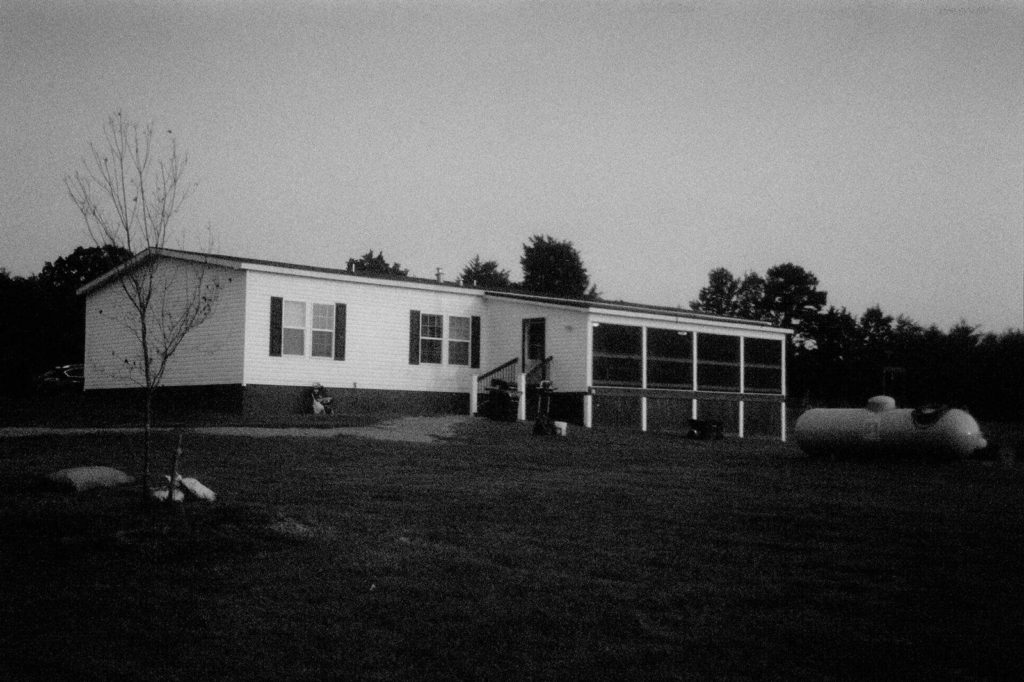
Christine Fore's house in Virginia
[Tricia]: You were talking about how when you were making this podcast, you were really valuing oral histories, and the power of taking people by their word, and how your conversation with your grandmother shifted your ideas on these issues.
What do you think is the importance of oral history in talking about matters like gentrification, and other incredibly impactful historical moments?
[Amaan]: In one of my classes, we were talking about history and who gets to tell history, and how history is an ideological thing, for the lack of better words.
[Essentially], who has been able to tell history is usually very flawed in a sense: the idea that the winners are the people who are able to tell history and that is very flawed because it comes from one perspective. And that’s why oral history is so important.
For instance, UPenn has a section on their website, or a part of their curriculum, where they talk about their presence and part in gentrification of West Philadelphia. And I didn’t use it as a resource, because it very much pussy-foots around the issue, and makes it seem like their part in it was just helping, and it wasn’t as deeply profound as it was. So having first-hand accounts of people who aren’t being paid by UPenn and who aren’t a part of the university, is incredibly important.
I included other aspects of primary resources, of first-hand accounts in it that I had gotten from other universities, like the University of Kentucky has a specific oral history section about the great migration and specifically, the great migration to Philadelphia and so the opening of my podcast uses one of those interviews from a man who went in Philadelphia from the 30s to the 90s.
The part that I used talked about how UPenn was not there for the community, how it wasn’t there to accept people into the university who were a part of the area, and that was a noted thing of the residents within West Philadelphia. And that could have been a whole missing thing because Penn can be like we have always been a proponent of diversity.
So it is always important to have multiple perspectives on the issue, especially of the people there at the time, and it is not always beneficial to believe the people with the loudest voice and the people who have the most power to gear history to their favor.
Because in history, we learn about people with ‘significance’, we learn about people with notoriety, like emperors and queens, and we don’t typically know how the majority of the population lived. So I think it’s incredibly important [to highlight] those pieces of evidence of the daily person.
‘Because in history, we learn about people with ‘significance’, we learn about people with notoriety, like emperors and queens, and we don’t typically know how the majority of the population lived. So I think it’s incredibly important [to highlight] those pieces of evidence of the daily person.’
[Tricia]: So you were talking about Penn and Penn’s image as promoting this diversity, as being “connected to the community,” which is really this mythological portrayal of what they were doing. For instance, in the podcast, Penn was using these keywords to justify their harmful actions like ‘education’ ‘safety’ ‘protocol’ and ‘students.’
Even so, do you think there are options or alternative routes for schools, or education at large (high school, college, or just someone going to a library to learn) to combat these racist systems, like gentrification?
[Amaan]: At first, I thought that they [colleges like Penn and Columbia] should be transparent about what they are doing, but I don’t know, Penn was allegedly transparent about what they were doing and what has that served, considering they are still the biggest private developer in Philadelphia?
So I think a good place to start in combating gentrification is understanding history in a global context, and the things that allow these systems to persist.
Because I think if you are decently well-informed about these issues, it makes it easier to think about possible solutions. Classes like [‘Race, Space and Policing’] demystified it [gentrification], so you know how to combat it. [The class] broadens your perspective.
In terms of colleges, I was thinking about how in high school, it was mandatory for incoming freshmen to take ‘Peace & Justice’, so I think colleges should at the very least be thinking about something like that. So for any new students, transfer students, it should be mandatory that you take a class on these problems.
Because I genuinely, genuinely believe that the ‘Race, Space and Policing’ class I took over the summer was the most eye opening class I have ever taken in my whole academic career thus far. So I think a class like that should be mandatory for every student coming in. [Even though the class would be difficult] it would be in a setting where people unpack with other students, and teachers.
I don’t think a NYU or a Columbia or a Penn is ever going to stop dividing and conquering, and stop being a private developer because that is where you can make a lot of money. So I guess at the very least, providing students the knowledge on how to tackle an issue like that.
“I don’t think a NYU or a Columbia or a Penn is ever going to stop dividing and conquering, and stop being a private developer because that is where you can make a lot of money.”
[As a student] you should always be critical of the institution you are in, and don’t ever think you are unwarranted, or that you are being too hard on them. It’s important that the work continues.
[Tricia]: It is also important to realize that this is only the first step. In many ways, the podcast, the class you took, could be the first step for someone else to also begin their journey of self-awareness, and self-reflection that is so incredibly necessary when talking about these important issues because it really comes down to thinking about these things critically. Your podcast showed how important the personal aspect to all of this is.
Everyoneis tied to gentrification, whether you are impacted by or impacting it. This is an incredibly personal topic, and your point about making a class like ‘Race, Space and Policing’ a requirement says that [gentrification] is a priority for everyone: for the professor (because the power is in the professor not the institution that may try to co-opt it) and for the students. So thank you so much for really emphasizing that.
[Amaan]: Right, like I have been fortunate enough to have taken these classes because these are things that I am interested in but for kids who are non-humanities majors, and they may never be exposed to this kind of material, since it does not allegedly intersect with their departments even if you could easily make the connection that it does. And it is even more important for those kinds of fields to also be exposed to these issues. And that is why I stress that every single student should take these classes, even if it doesn’t correlate with what they want to study.
[Tricia]: It certainly does. Gentrification deals with economics if you are an econ major, it even deals with computer science since it deals with how one charts development, like what kind of systems do you use to demonstrate these statistics.
So you are right. It is so important to place these conversations at the forefront of how we construct education, because school is meant to educate the next generation so what issues do we feel are important enough for the next generation to also consider?

Child walking in North Philadelphia

